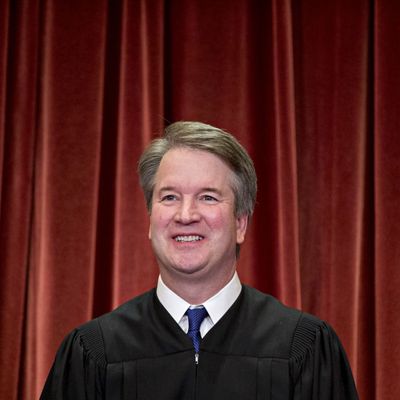
Christine Blasey Ford’s sexual-assault allegations against Brett Kavanaugh rightfully dominated public and congressional attention during the battle over his nomination to the Supreme Court last September. But prior to the multiple, credible allegations of sexual misconduct levied at Kavanaugh, there were several pockets of controversy that were eventually overlooked, as he slid into a lifetime appointment with a vote of 50 to 48. This week, news of a previously unreported sexual misconduct allegation against Kavanaugh sparked calls for his impeachment (and criticism of this new push), with some noting that the confirmation process left a number of questions unresolved, aside from the justice’s behavior toward women. Below is everything we know about the outstanding concerns surrounding Kavanaugh, involving the all-American topics of email, baseball, and debt.
His White House Emails
During the nomination process, Democratic lawmakers were frustrated by Republican efforts to restrict the release of Kavanaugh’s emails from his time in the Bush administration; while Democrats wanted correspondence from all six years, only those from his time as an associate counsel were released. 141,000 pages of documents were deemed “committee confidential,” meaning senators could view them, but the public could not. At least two of the confidential emails leaked, involving matters not exactly concerning national security, but reflective of the profoundly bro-y (and racist) crew Kavanaugh ran with at the time.
In one exchange about a fellas-only trip from September 2001, one of Kavanaugh’s friends jokes about their rented boat, the Su Ching: “Boys, Although you may be hoping that I’ve lined up a hostess for a rub-n-tug massage session, ‘Su Ching’ actually is the sailboat.” In another, dated September 10, 2001, Kavanaugh apologizes to his friends about “growing aggressive after blowing still another game of dice (don’t recall).” He also reminds his “crew” about being “very, very vigilant w/r/t confidentiality on all issues and all fronts, including with spouses.”
During his Senate confirmation hearings, no questions were asked on why the massive stack of documents were kept restricted.
Accusations of Gambling Debt
The dice game on the boat led to further conversations surrounding Kavanaugh’s non-beer vices. After the email leak, Rhode Island senator Sheldon Whitehouse submitted written questions to the SCOTUS nominee, asking if he “ever sought treatment for a gambling addiction” and requested that he detail his gambling habits. Kavanaugh dismissed anything beyond a casual and infrequent relationship to betting, but that did not put an end to speculation about the massive debt he reported in May 2017 — somewhere between $60,000 and $200,000.
Kavanaugh defended his potential six-figure credit-card debt by the time of his nomination with a janky alibi: He was buying playoff baseball tickets for a “handful” of his “boys,” though he never provided Whitehouse with the requested dates of reimbursement the senator asked for. Past financial disclosure forms showed this was not the first time the judge racked up substantial credit-card debt, falling into a similar $60,000 to $200,000 hole in 2006, the year he was confirmed to the U.S. Court of Appeals for the D.C. circuit.
The Debt Evaporates
Kavanaugh’s explanation for how he got rid of the debt also doesn’t hold water: He claims that his friends simply paid him back for the Washington Nationals tickets in cash. But as former Office of Government Ethics Director Walter Shaub notes:
As a lawyer working in the public sector for most of his professional life, Kavanaugh also lacks the assets of other Supreme Court judges, making two rounds of six-figure debt a significant swing in and out of the red.
An Income Versus Asset Imbalance
The financial incongruities continue. Not only was Kavanaugh able to quickly pay off the substantial debt on a federal judge’s salary of $220,000, he also paid his mortgage on his $1.225 million home in Chevy Chase, Maryland; tuition for his kids at a $10,500-a-year private school; and annual dues of $9,000 at a tony country club — all with a single breadwinner in the household. Back when he purchased his house in 2006, he would have needed $245,000 in cash for a standard 20 percent down payment. But as Mother Jones reports, in 2005, Kavanaugh had assets of around $91,000. (Also in 2006, he reported between $60,000 and $200,000 in debt, split between three credit cards and a loan, per the Washington Post.) After the purchase, according to financial disclosure forms, Kavanaugh’s liquid assets did not decrease. Questioning the judge in writing, Senator Whitehouse asked:
The value of assets reportedly maintained in your ‘Bank of America Accounts’ in the years before, during, and after this purchase never decreased, indicating that funds used to pay the down payment and secure this home did not come from these accounts. Did you receive financial assistance in order to purchase this home?
Kavanaugh did not answer directly, claiming that he took out a loan against his retirement fund worth around $70,000 — meaning that he wouldn’t have had enough even for a 10 percent down payment on his house.






























